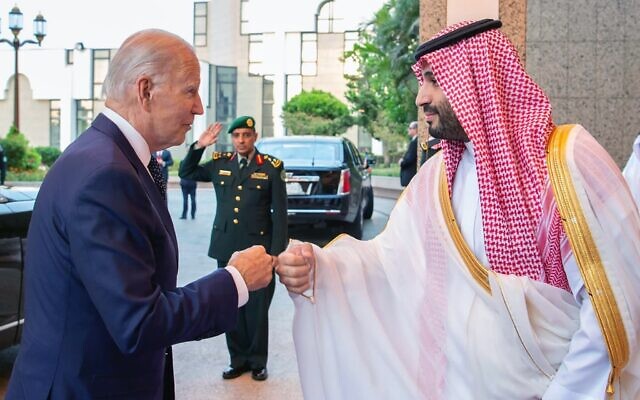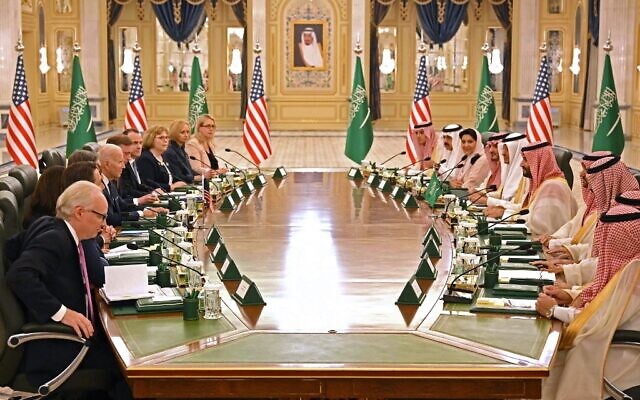To normalize with Israel, Saudis want US okay for civil nuclear program — diplomat
Middle East official stresses deal remains ‘far off,’ amid Congressional opposition to boosting defense ties with Riyadh and intensifying Israeli-Palestinian violence
Jacob Magid is The Times of Israel's US bureau chief

Saudi Arabia has asked the US to green-light its development of a civilian nuclear program in exchange for the kingdom normalizing relations with Israel, a senior Middle East diplomat said Thursday.
The civilian nuclear program is among several demands Riyadh has presented in talks with the Biden administration over the past year, the diplomat said, confirming a report in The Wall Street Journal while clarifying that such a deal remains “very far off.”
The senior diplomat said that although Washington is interested in brokering a normalization agreement, Riyadh is not rushing to sign on, recognizing Congressional opposition to Saudi demands for closer US defense cooperation. The diplomat also noted intensified violence in the Israeli-Palestinian conflict since Prime Minister Benjamin Netanyahu’s hard-right government took office in late December, which has made such a deal with Jerusalem less palatable in Saudi Arabia and the broader Muslim world.
Given the Biden administration’s fears that a Saudi nuclear program could further accelerate a regional nuclear arms race, Riyadh has suggested developing it in full cooperation with the US and agreeing to American monitoring and inspections, the diplomat said, while acknowledging that Washington has not yet been sold on the idea.
Further complicating the effort, Saudi Arabia is also conditioning a normalization deal with Israel on a significant expansion of defense ties with the US, including a system of guarantees to prevent future administrations from pulling out of weapons deals that have already been signed, the diplomat said.
Notably, the Middle East diplomat revealed that Saudi officials have not raised a specific demand related to the Palestinian issue in their talks with the US, as the United Arab Emirates did when it conditioned its decision to normalize ties in 2020 on Netanyahu shelving his plan to annex large parts of the West Bank.

The diplomat speculated that a Palestinian-related demand would likely be raised toward the end of the negotiations.
Saudi officials have repeatedly stated publicly that they will not normalize relations with Israel until the establishment of a Palestinian state, which the current Netanyahu government vehemently opposes.
The Gulf kingdom has also issued a series of condemnations of the Israeli government in recent months, including for National Security Minister Itamar Ben Gvir’s visit to the flashpoint Temple Mount, a series of deadly IDF raids in the West Bank, the legalization of West Bank outposts and Finance Minister Bezalel Smotrich’s call to “wipe out” a Palestinian town.
While Riyadh periodically weighed in on the Israeli-Palestinian conflict in the past, the frequency and intensity of the condemnations since Netanyahu’s latest government was formed have been unprecedented in recent memory, further indicating a normalization deal remains far off.

Analysts have also speculated that a deal will not take place during the lifetime of Saudi King Salman. The ailing 87-year-old is seen as a longtime stalwart of the Palestinian cause. His son, Saudi Crown Prince Muhammad bin Salman, has indicated more willingness to reach such a deal, largely due to his desire to boost cooperation against Iran.
Saudi Arabia did agree last year to open its skies to Israeli airliners in a move characterized by the Biden administration as a first step toward normalization with Israel, though Riyadh quickly rejected the notion that the move was a precursor to any additional steps.
An official familiar with the matter told The Times of Israel that a normalization deal would be more likely under a Republican administration, as Riyadh believes it will be able to get more than it would under a Democratic president.
But opposition on Capitol Hill to warming ties with Riyadh has extended to both parties, due to Saudi Arabia’s human rights record and energy policies, with many fuming last year over oil production cuts.









